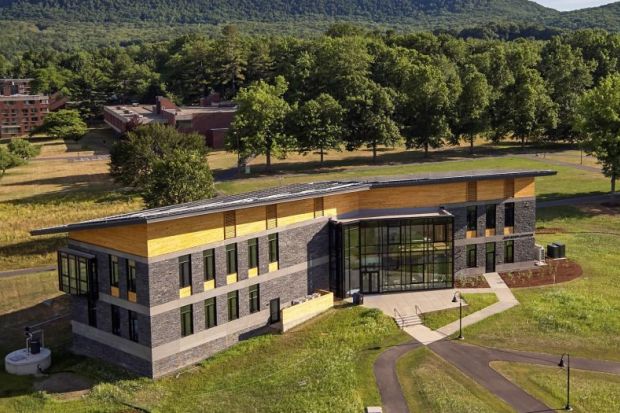Hampshire College, the struggling experimental campus where students craft their own majors, is projecting a 45 per cent leap in enrolment this coming year, thanks in part to some high-profile political trouble 1,500 miles away.
More than two dozen students from New College of Florida – the public liberal arts institution currently under heavy disruption by the state’s governor, Ron DeSantis – have taken steps to move to western Massachusetts for the coming autumn semester at Hampshire. They’re part of Hampshire’s expected rise in enrolment to 725, from just below 500 now, a Hampshire spokesperson said.
New College students appear to be an especially good fit for Hampshire because both campuses have long operated under a model of student-designed learning and choices of majors, said the Hampshire spokesperson, Jennifer Chrisler.
“It was a pretty straightforward and not a terribly hard decision from the perspective of the college,” Ms Chrisler said.
The two institutions also have a shared environment of progressive politics – at least until Mr DeSantis moved early this year to replace the majority of the trustees at New College, triggering a chain of actions that have included the firing of its president, Patricia Okker, the departure of its provost and the denial of tenure for at least five professors.
Mr DeSantis, an expected 2024 US presidential contender, has spoken of remaking New College, in Sarasota, in the image of Hillsdale College, a private and politically active conservative Christian liberal arts institution in Michigan.
Hampshire, meanwhile, nearly closed in 2019, raising questions about its model of rejecting traditional academic structures. But under a new president, Edward Wingenbach, Hampshire slashed its staff by nearly 40 per cent, directed students toward a narrower range of options for their majors and raised nearly $40 million (£32 million) toward a goal of $60 million to help rebuild its bank balance and begin rehiring faculty.
Hampshire’s enrolment remains well below its pre-crisis norm of around 1,100 to 1,200, though Ms Chrisler said it was on track to regain that level by the 2026-27 academic year.
Yet costs remain a major concern. And while the missions and political atmospheres of New College, founded in 1960, and Hampshire, opened in 1970, might match, their price tags do not. New College charges $6,916 for in-state tuition and $29,944 for out-of-state students, while Hampshire asks for $52,714.
Hampshire, though, is offering to help New College students cover the difference and to make the application and transfer process as easy for them as possible – even waiving standard time requirements so that New College seniors can come to Hampshire for their final year only.
“When the college started to come under attack politically, it made perfect sense from a values alignment and from a pedagogy alignment,” Ms Chrisler said of New College. “So what better way to show that we were committed to those things than to offer those students the opportunity to transfer without a lot of hurdles.”
Dr Okker’s interim replacement as New College president, Richard Corcoran – a DeSantis ally and former speaker of the state House of Representatives – has dismissed the Hampshire offer to his students as a matter of financial desperation.
Given the political antagonisms, Dr Wingenbach began his outreach to New College through its student groups, and helped them get connected with Hampshire students who could offer advice and administrators who could manage the transfers.
At least 27 students from New College have filled out the necessary paperwork to get the process started: 10 have completed it and four have put down deposits, Ms Chrisler said.
Dr Okker said she did not know of any other US colleges or universities making similar offers to New College students.
One of Hampshire’s main concerns, Ms Chrisler said, was to avoid taking any action that would harm efforts by New College to fight back against the political assault on its leadership and operations. But, she said, “at a certain point it just became very clear that there was no going back from where the governor and the board were headed”.
Register to continue
Why register?
- Registration is free and only takes a moment
- Once registered, you can read 3 articles a month
- Sign up for our newsletter
Subscribe
Or subscribe for unlimited access to:
- Unlimited access to news, views, insights & reviews
- Digital editions
- Digital access to THE’s university and college rankings analysis
Already registered or a current subscriber? Login







